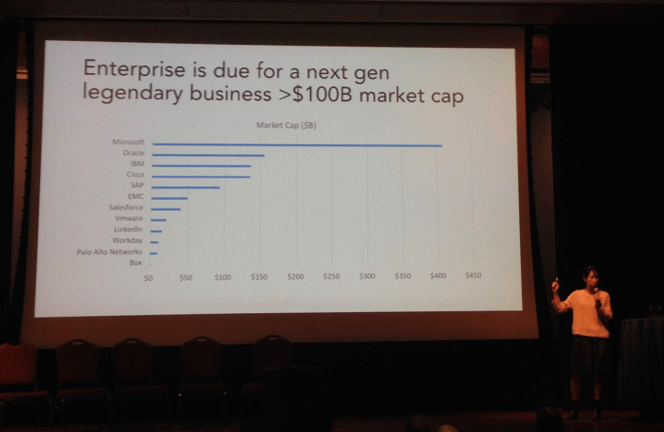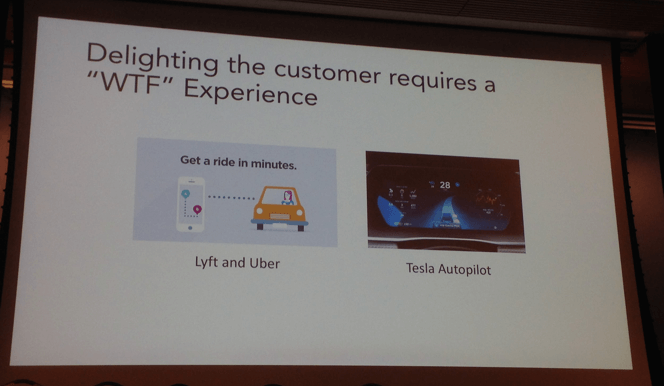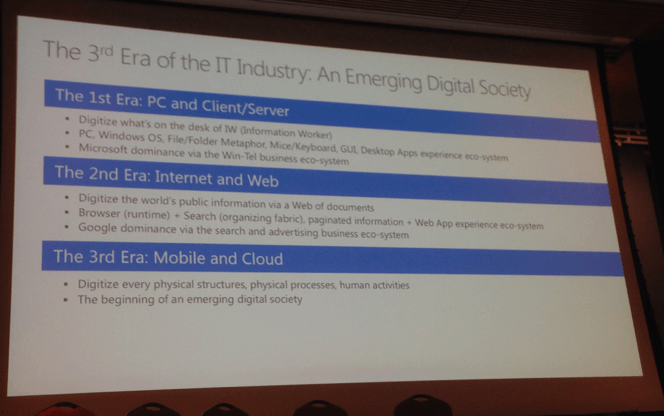On Monday, I attended the VC and Industry Day at the Web Search and Data Mining conference (WSDM), an annual event sponsored by the ACM, bringing together academia, faculty, and industry researchers. The VC and Industry Day features prominent speakers including Ron Conway (founder and managing-partner of SV angel, a "startup's best friend" and frequent investor), Ann Miura-Ko (the "most powerful woman in startups"), Qi Lu (EVP, Microsoft), and numerous panels of data scientists from Uber, Lyft, Airbnb, Slack, etc.
Below are the most intriguing ideas I heard from these visionary speakers.
Caveat: These are my personal interpretation of their presentations, which may not necessarily capture their intent.
Data Science: Hype or Hallelujah?

This is the question put first to Ron Conway. It was a good kickoff because it reflected a feeling shared by so many people I meet who have tired of the term "data science" because of overuse in media. Conway took the topic head-on, saying data science is actually still underhyped. Even though big companies seem to have incredible amounts of data, it is not being manipulated enough to reveal its true power and value. But it's just a matter of time. He sees the democratization of machine learning driving a new wave of startups across various verticals.
Ann Miura-Ko was just as enthusiastic. She stressed what a huge impact data science would make on many industries across the enterprise space. According to her, "Enterprise is due for a next-gen legendary business with >$100B market cap."
Looking at past paradigm shifts—from mainframe/PC to internet to cloud—Ann pointed to data as the next sweeping paradigm.
Putting aside the valuation claim, I agree. Data science is already delivering incredible value and we're still in the very early days. I've read claims that 1.7 megabytes of information will be created every second for every human on the planet by 2020. With so much data, finding meaning will not just be important—it will deliver insights and value most of us cannot even imagine.

Self-Driving Enterprise Applications
Continuing the theme of paradigm shifts, Ann Miura-Ko suggests the rise of a new category of enterprise apps: self-driving applications. She sees these as applications combining data, presentation, business logic, and intelligence. She suggests the business logic will actually adapt to data to deliver new kinds of experiences—experiences where the data itself can help users discover the meaning and what matters. This new approach will transform domains throughout businesses, across finance, HR, ERP, CRM, health and more. And that transformation won't be a small improvement. It will be surprising—even shocking. It's what Ann calls a "WTF" experience. Exactly what companies need to do to delight customers. Just like Uber and Lyft or Tesla Autopilot.

Conversational User Interfaces (CUI) for the Emerging Digital Society
The shifts kept coming as Qi Lu gave an inspiring overview of the evolution of how people interact with technology. Qi characterizes the three eras of the IT industry as:
- PC and Client/Server
- Internet and Web
- Mobile and Cloud, which is the dawn of an emerging digital society

He notes that current web and current mobile apps don't unlock the potential of our data and connectivity. Take current mobile apps as an example. Nowadays, if a user wants to do something on the mobile phone, even though it is a simple task that may happen only once or twice a year, the user still has to download and install the app for the task. Mobile search, in a similar vein, is broken. People have to quit the current app to find what they need. The user experience is just too interrupting.
Qi believes the rise of a conversational user interaction (CUI) is inevitable. Early examples include WeChat in China, Slack in enterprises, Facebook Messenger/WhatsApp and others. But he's quick to point out that CUI is not just about messaging. Instead, it's the conversation itself that defines the core. That conversation can be human-to-human, human-to-bot or human-to-agent. But what matters is that conversation becomes the new browser in the era of mobile and cloud. This new era won't be about downloading apps. Instead, your "conversation" would indicate your intention and the technology would find the resources to respond. For that to happen, machine learning and AI become the enabling technologies.

Where Will We See the Biggest Impact?
Getting back to the practical: A key theme throughout the conference is the importance of applying data science to real business applications. Today's machine learning and data science is not a magic option you add to data to automatically deliver insights that matter. Ann suggests that data scientists take a detailed look at the operational needs in various markets to uncover broad challenges, like "time machines" to look at massive data sets over time, high-dimensional databases, enterprise-class machine learning servers and other high-impact open source projects. At the same time, they should analyze specific needs and challenges within vertical markets to know where to apply their efforts. She reminds us that business opportunities will be in those ripe verticals where money is available but held hostage by a lack of insight. Personally, I think that idea that spending is limited more by a lack of insight than a lack of money is one of the core ideas of Silicon Valley history.
At Clari, we believe that data science will change the way almost all of us work. In fact, our company is built on that premise. We couldn't agree more with Ann as we spend late nights co-creating with our customers by listening, understanding their problems, and identifying ways that data science can make their lives better. Following Ann's advice, we chose sales as our area to transform. For business, sales is the key to growth. Sales teams face so many challenges and we're just getting started—whether it's identifying at-risk deals, understanding the quality of a rep's activity, or adding more science to the art of forecasting. We're excited to be on this journey. If applying data science to serious, real-world challenges attracts you, maybe you'd enjoy meeting the team.


